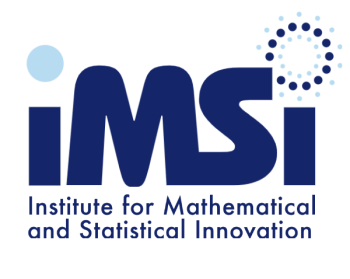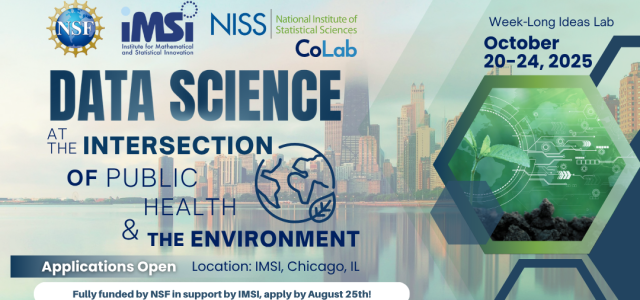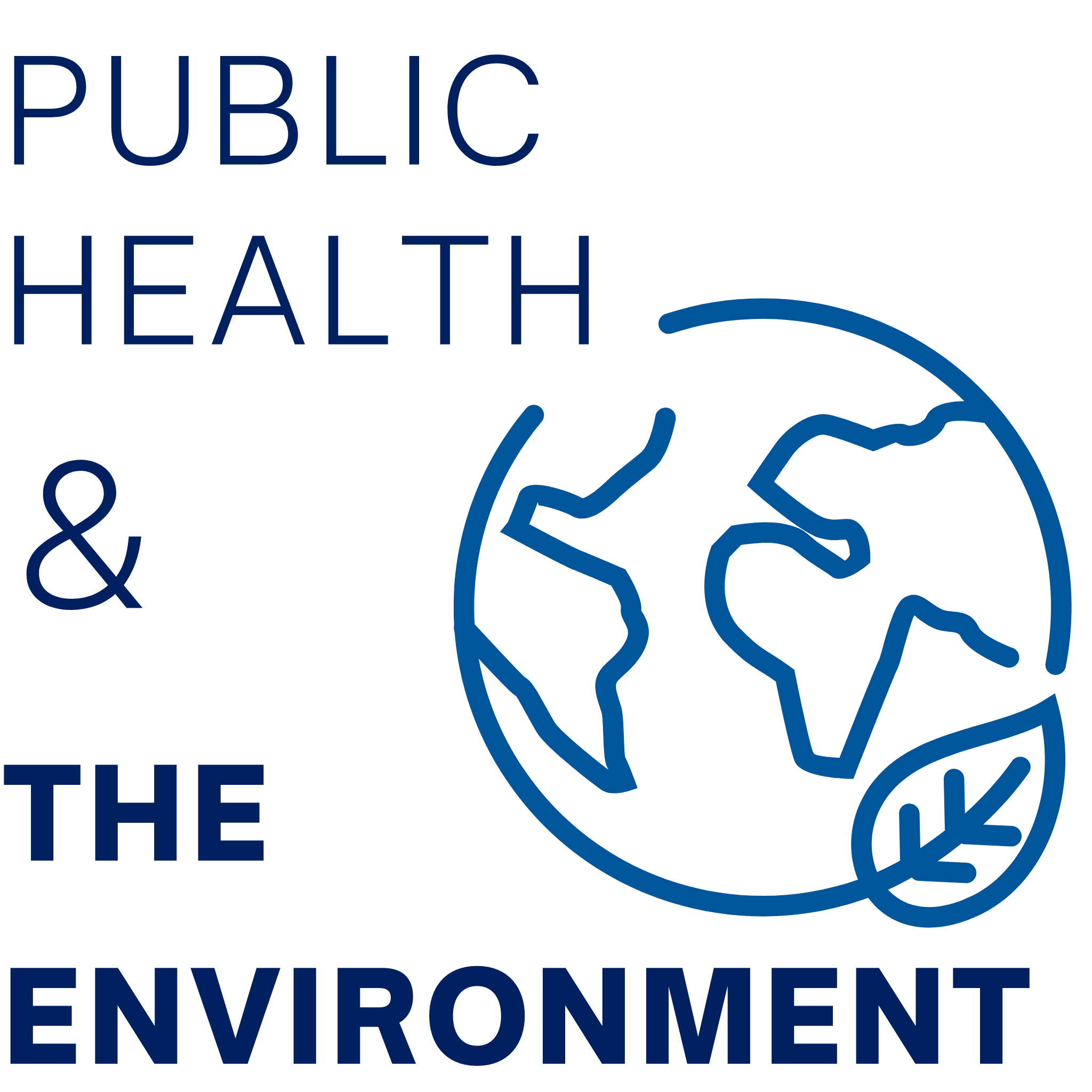Please Note: This workshop has already taken place, a news story from this workshop is available here: IMSI-NISS Ideas Lab Explores Data Science at the Intersection of Public Health & Environment | National Institute of Statistical Sciences
Overview
IMSI and the National Institute of Statistical Sciences (NISS) are organizing a workshop on Data Science at the Intersection of Public Health and the Environment. This event will bring together experts from diverse fields to explore innovative methodologies, foster collaboration, and address pressing challenges in public and environmental health using data science techniques.
Download Flyer: ![]() Flyer 8.5x11 IMSI-NISS Data Science Health & Environment.pdf
Flyer 8.5x11 IMSI-NISS Data Science Health & Environment.pdf
Scientific Description
Human-natural systems are increasingly interconnected, with data-driven science and engineering enhancing our understanding of these complex interactions. The intersection of environment and public health is of paramount importance, as environmental changes can significantly impact human health outcomes. Statistical and mathematical tools play a crucial role in understanding these intricate relationships, and emergent data sources combined with modern methods offer promising solutions. However, transdisciplinary methodological innovations are necessary to fully tackle these multifaceted challenges.
Key Research Areas:
- New inferential approaches: Summarizing, linking, and analyzing diverse datasets from epidemiological studies, health registries, environmental monitoring, and surveys to uncover shared patterns, trends, associations, and causal relationships.
- Species abundance and diversity modeling: Leveraging big data to assess ecosystem and biodiversity health across different spatial and temporal resolutions.
- Innovative sampling techniques: Designing efficient and representative data collection methods while quantifying variability, bias, and uncertainty in joint environmental and health studies.
- Co-modeling of extremes: Developing methodologies to model the probability and magnitude of rare events in both environmental and human health domains (e.g., floods, wildfires, droughts, pandemics, food insecurity).
- Mathematical modeling of environmental systems: Simulating biological, physical, and chemical processes, hypothesizing tipping points, and integrating causal models to assess intervention impacts.
Workshop Format
This workshop will feature an intensive in-person research studio or ideas lab, fostering high-impact interdisciplinary collaboration. The event will commence with keynote presentations and tutorial sessions, followed by iterative brainstorming and working group formation.
Structure:
- Virtual Thought Summit: August 21, 2025 at 12-2pm ET
- Speakers: Christopher K. Wikle (University of Missouri), Marianthi-Anna Kioumourtzoglou (Columbia University) and Jonathan Hobbs (Jet Propulsion Laboratory (JPL))
- Moderator: Bo Li (Washington University in St. Louis)
- Watch on YouTube: IMSI/NISS Virtual Thought Summit Webinar: Data Science, Public Health & Environment, August 21, 2025
- Speakers: Christopher K. Wikle (University of Missouri), Marianthi-Anna Kioumourtzoglou (Columbia University) and Jonathan Hobbs (Jet Propulsion Laboratory (JPL))
- In-Person Workshop (5.5 days):
- Lightning Talks and Provocateur Presentations on grand challenges and cutting-edge methodologies.
- Facilitated small-group discussions alternating with full-group presentations and feedback sessions.
- Development of concrete research questions, collaborative writing, and initial project ideation.
- Post-Workshop Activities:
- Follow-up meetings for research working groups.
- Themed virtual events (short courses, data visualization sessions, research talks).
- Potential joint IMSI-NISS long-term research programs.
Participation & Abstract Submission
We invite researchers from academia, government, and industry with expertise in statistics, epidemiology, environmental science, and related fields to apply.
How to Join:
- Eligibility: Open to all researchers, with emphasis on interdisciplinary collaborations.
- Application Process: Submit a brief statement of interest and a CV.
- Selection Criteria: Participants will be selected based on their research alignment, expertise, and potential contribution to collaborative efforts.
Abstract Submission:
Participants interested in presenting research or contributing ideas should submit a 300-word abstract summarizing:
- Research focus and relevance to workshop themes.
- Key methodologies employed.
- Potential collaborative research questions.
- Submission Deadline: August 25, 2025 11:59PM (UTC-5)
Logistics
- Workshop Length: 5 days
- Dates: 1 week (October 20-24)
- Venue: IMSI at the University of Chicago
Additional Activities
The workshop will be complemented by a series of themed semester events, including:
- Virtual research updates from working groups.
- Poster sessions for early-career researchers.
- Hackathons and data visualization challenges.
- Collaborative capstone projects with government and industry partners.
Funding & Support
NISS will provide administrative support for the program, including organization of virtual pre- and post-workshop events. Additional funding may be sought through NISS affiliates to support new researcher travel.
Contact Information
For inquiries, please contact: mglenn@niss.org
Join us in tackling the pressing challenges at the intersection of public health and the environment through data science!
Organizing Committee
- Bo Li (Washington University in St. Louis, Statistics & Data Science)
- Simone Gray (CDC/NCCDPHP/DCPC)
- Corwin Zigler (Brown University, Biostatistics)
- David S. Matteson (Cornell University & NISS)
- Dorit Hammerling (Colorado School of Mines, Applied Mathematics & Statistics)
- Mevin Hooten (University of Texas at Austin, Statistics & Data Science)
About the Intersection of Public Health & the Environment
Human-natural systems are increasingly interconnected. Data-driven science and engineering enhance our understanding of these complex processes. The intersection of Public Health and the Environment is among the most systemically important - each facing its own urgent crises, and with growing spillover of negative environmental outcomes influencing negative human health outcomes, in particular. Mathematical and Statistical tools are essential for understanding and addressing the complex and interrelated challenges of public and environmental health. Emergent data sources coupled with modern methods have great promise to help mitigate future risks, but transdisciplinary methodological innovations are required to comprehensively address multi-faced challenges.
Data-driven research directions at the intersection of public health and the environment
- New descriptive and inferential approaches are needed to help summarize, interpret, link, and then analyze data across a spectrum of diverse sources, from epidemiological studies and health registries to environmental monitoring and surveys. These will enable discovery of shared patterns, trends, associations, and even causal relationships between environmental factors and health outcomes.
- New species abundance, richness, and diversity models harvested through big data can help measure and contrast ecosystem and biodiversity health across spatial and temporal resolutions. They will also help assess human, climate, and invasive species impacts on the environment.
- New sampling techniques can help design and optimize efficient and representative data collection methods for joint environmental and health studies, and provide new means for quantifying variability, bias, and greater uncertainty.
- Advances in the co-modeling of extremes is essential to holistically model both the probability and size of rare events across the environment and human health, from fires, floods, plant and animal imbalance, and droughts to malnutrition, water and food insecurity, epidemics, and pandemics. They can further lead to the discovery of additional unrealized and unknown risks across public and environmental health.
- Advanced mathematical modeling of the environment can help simulate dynamics and interactions of biological, physical, and chemical processes for the future environment. Tipping points can be hypothesized, and when coupled with causal models for health outcomes, the effects of different interventions and policies on diverse scenarios can be studied as robustness and resiliency is further integrated into environmental and health systems.
Event Type
- NISS Hosted
Host
Sponsor
Website
Location
Policy





